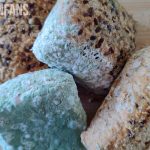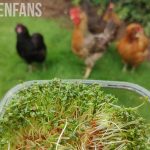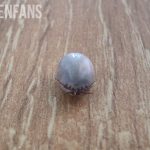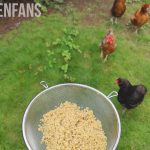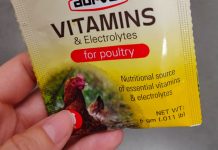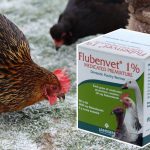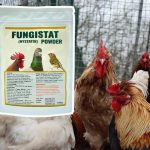Can Chickens Eat Pumpkins and Pumpkin Seeds?
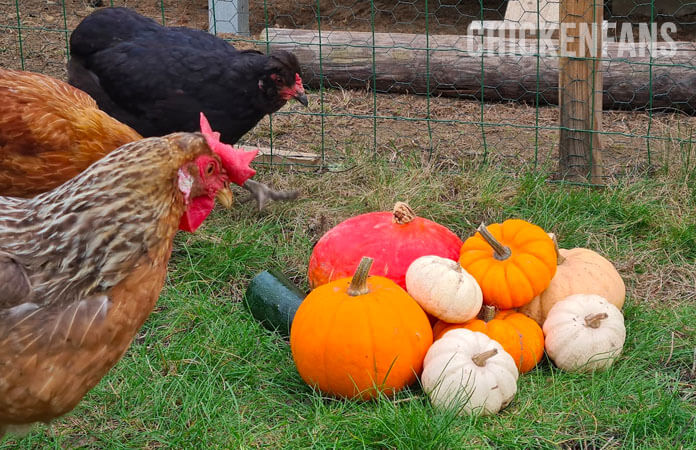
Nutrients | Health Benefits | Amount | Seeds | Leaves | Flowers | When to avoid
Chickens can safely eat pumpkins and love pumpkin seeds. Pumpkin scraps are a healthy addition to a chicken’s diet as they contain many vitamins, especially vitamin A.
With the Halloween season coming up, everybody is preparing their jack-o’-lantern pumpkins. Keep some flesh and seeds aside for your backyard flock. We’ve also selected 10 pumpkin varieties your chickens will love.
Key takeaways:
- Chickens can eat pumpkins and pumpkin seeds
- A small cup of pumpkins provides more than 200% of the daily vitamin A intake for chickens
- Pumpkins are 90% water
Can Chickens Eat Pumpkins?
Yes, chickens can eat pumpkins and pumpkin seeds. You can safely feed them Halloween leftovers, as pumpkins are a healthy food source rich in minerals and vitamins A, C, and B6. Pumpkins can keep your chickens hydrated, boost their immune system, and helps your flock see in the dark.
This video shows how they gobble up the seeds first:
Nutritional Value of Pumpkins for Chickens
A pumpkin is 90% water, which makes them very low in calories. However, they come with an amazing amount of beta-carotene and vitamin A and are loaded with several other healthy micronutrients.
Pumpkins can’t replace regular food because they don’t contain enough proteins and carbs.
| 100g Raw Pumpkin | Amount | % DV Laying Hen |
|---|---|---|
| Calories | 26 kcal | ~8 % |
| Water | 91,6 g | – |
| Protein | 1 g | ~5 % |
| Carbs | 6,5 g | – |
| Fiber | 0,5 g | – |
| Sugar | 2,76 g | ~9 % |
| Vitamin A | 8510 IU | ~280 % |
| Vitamin C | 9 mg | ~9% |
| Vitamin B6 | 61 µg | ~2% |
| Folate | 16 µg | ~1,5% |
| Vitamin E | 1,06 g | ~8% |
| Panthothenic Acid | 0,298 mg | ~3% |
| Potassium | 340 mg | – |
| Calcium | 21 mg | ~ 0,6% |
A small cup of 100g pumpkin cubes contains more than 200% of the optimal recommended daily vitamin A intake for laying hens. It’s also rich in vitamins C and E and comes with a vitamin B-complex. Pumpkins contain vitamins B6, B9 (Folate), and B5 (Panthothenic Acid).
All these vitamins are essential for a chicken’s health:
- Vitamin A is essential for several metabolic processes and helps chickens see in dim light and shady environments. It’s essential for eye health, fertility, the immune system, and proper growth in chickens.
- Vitamin C is an antioxidant vital for the proper functioning of the immune system. It plays a role in tissue growth and blood vessel health and is involved in many body functions.
- Vitamin B6 is vital for the metabolism of the nervous system and the immune system
- Vitamin B9 or folate is essential for cell growth and the creation of red blood cells
- Vitamin B5 is pantothenic acid is key for creating blood cells, and helps to convert food into energy
Pumpkins also contain plenty of minerals that chickens need for their organs, muscles, bones, heart, and brain to work properly.
Health Benefits of Pumpkins for Chickens
Pumpkins come with many health benefits for backyard chickens:
- Boosts the immune system: pumpkins are loaded with beta-carotene and vitamin C, which are antioxidants that protect against internal damage from free radicals. The chicken’s body turns this antioxidant into vitamin A, which helps to ward off gems, boosts the kidneys, and reduces the risk for chronic diseases.
- It keeps the flock hydrated: pumpkins are 90% water, which is essential for proper digestion and for the organs to do their job. Chickens also require water to regulate their body temperature
- It helps them to cool down: the water, minerals, and electrolytes in pumpkins allow chickens to cool down from heat stress when it’s hot
Most people classify pumpkins as vegetables, but botanically, it’s a fruit that contains seeds. Like other fruits, pumpkins come with some sugars. However, these are very small amounts that won’t raise the blood sugar levels of chickens.
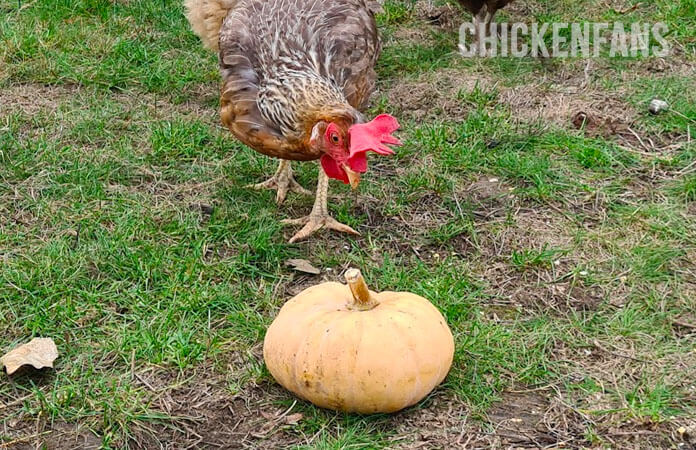
How Many Pumpkins can Chickens Eat?
As pumpkins are no regular food, they are considered a treat. The rule of thumb is that treats should generally be limited to about 5% of the feed intake.
However, pumpkins do not contain a high amount of sugar or toxins, and pumpkins are extremely healthy. So it won’t hurt them if they go on a pumpkin spree once in a while. However, always ensure they get enough of their regular food to prevent any other deficiencies.
Your hens will gladly assist you to get rid of the Halloween leftovers.
Can Chickens Eat Pumpkin Seeds?
Chickens can eat pumpkin seeds and pick the seeds out first. The seeds contain about 30% of nutritional proteins and are a source of healthy unsaturated fats. Although they don’t hold as much vitamin A as the flesh, pumpkin seeds carry an amazing amount of additional minerals, antioxidants, and micronutrients.
When you are carving demonic pumpkin faces for Halloween, keep the seeds apart for your birds.
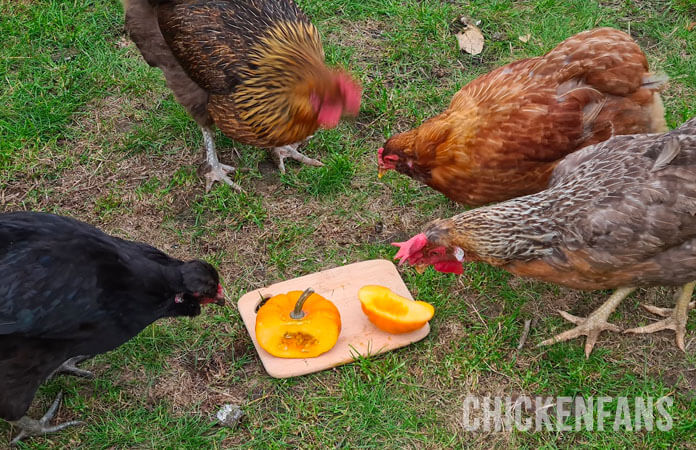
Can Chickens Eat Pumpkin Leaves?
Chickens can eat the big leaves of the pumpkin winter squash plant. Raw leaves contain vitamins A, B5, B6, B9, and C. They also have plenty of minerals such as zinc, iron, and potassium that will boost the chicken’s immune system. However, the leaves can be bitter, so not all chickens like them.
Can Chickens Eat Pumpkin Flowers?
Chickens can eat yellow pumpkin flowers. All parts of the blossom are edible and have a mild sweet pumpkin fruit taste. The flowers are healthy and rich in vitamins A, and C. Flowers can be fed raw or cooked, but never give chickens fried pumpkin flowers (popular in some cuisines).
When Not to Feed Pumpkins to Chickens?
Avoid feeding your chickens when:
- the pumpkin is rotten or damaged – only feed your flock pumpkins that you would eat yourself. Don’t feed them carved Halloween pumpkins that have candles in them.
- the pumpkin is moldy – molds are harmful to chickens, can affect their digestive system, and can cause several harmful fungal infections that are hard to treat
- the pumpkin is not properly washed – if you have store-bought pumpkins, avoid feeding your chickens with any toxic pesticides harmful to the little birds. While home-grown pumpkins don’t need any special treatment, pumpkin farms use chemicals in operation
- you have table scraps mixed with harmful ingredients – if the pumpkins are part of a dish that contains unhealthy ingredients, like dressings, oils, or onions, don’t feed them to your chickens.
Other Pumpkin-alike Food Sources for Chickens
Now that we established all the health benefits, it’s time to pick your pumpkins!
Pumpkins are typically part of a dish with other ingredients:
- Chickens love zucchini and cucumber
- Avoid feeding onions to chickens if they are in a salad mix with zucchini
- When feeding tomatoes to chickens be aware that they contain tomatine, which is slightly toxic to chickens
- Chickens can also eat broccoli, another nutritional powerhouse
If you want to learn more about chicken feed, please consult our ‘Chicken Food Page‘ to go and see every specific food article we address, including all articles on what chickens can and can not eat. Or go to our listicle food summary on ‘The Classroom‘.
